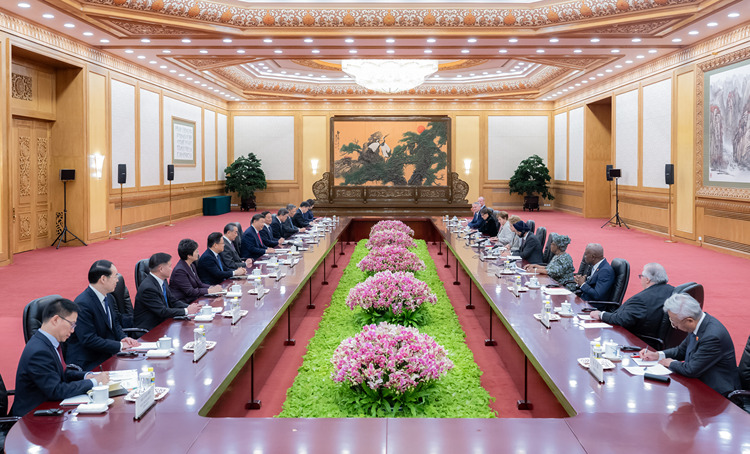
Facing mounting downward pressure on its economy and repercussions from the volatile world situation, China has attached great significance to the talks with the visiting heads of 10 major international economic organizations.
A core message for the guests at their series of meetings with President Xi Jinping, the heads of the central government and the key policymaking circles of the central leadership over the past two days, is that China has full confidence to achieve this year's economic growth target and will continue to play its role as the biggest engine of world economic growth through expanding its high-standard opening-up.
READ MOER: Xi stresses sound governance, high-quality development in border areas
Meanwhile, Beijing is intent on taking advantage of the meetings to call on all major economies and international economic organizations to objectively view the challenges facing the global economy, consolidate their confidence in the prospects of inclusive economic globalization, and thereafter make concerted efforts, along with China, to overcome the difficulties through cooperation, coordination and communication, rather than confrontation, containment and conflict.
In his meeting with the visitors on Tuesday, President Xi expressed the hope that international organizations will adapt to the changes of the times and proactively push forward institutional reform, so as to build a fair, just and rational global economic governance system.
As Xi urged, the key is to reflect the changes in the world, and effectively guarantee the Global South's representativeness and its corresponding right to a meaningful say in world economic affairs.
No matter how the global economic governance system is reformed, it must adhere to the principle of extensive consultation, joint construction and sharing, adhere to true multilateralism, and ensure that all countries have equal rights, equal opportunities and equal rules, otherwise, a widening development gap and growing global governance deficit will undoubtedly be a drag on the global economy.
Xi called for countries to strengthen cooperation rather than pursue beggar-thy-neighbor policies and to build a community with a shared future rather than resort to zero-sum games focused on building their own cliques. Countries are not individual small boats, but part of a big ship with a shared destiny. They should view each other's development as an opportunity rather than a challenge, and regard each other as partners rather than opponents, Xi told his guests, stressing that China is willing to practice multilateralism with their organizations.
Responding to Xi's remarks, the heads of the international economic organizations spoke highly of China's achievement in economic development and poverty reduction, and its adherence to a people-first development principle, and highlighted the important role it plays as a driver of world growth, an anchor for global stability and a promoter of multilateralism. They also conveyed their strong confidence in the benefits that China's pursuit of high-quality development will bring to the world, especially the Global South, and expressed the common hope that China can work closely with them to safeguard free trade and economic globalization, and make greater contributions to the common development and prosperity of the world.
ALSO READ: Firm confidence in prospects of economy
It is clear these organizations are well aware of the harm inflicted on the world economy by the protectionist, unilateral and clique-building approaches some developed economies have adopted to try and resolve their own problems, which result in them trying to create "small yards with high fences", seriously disrupting the global industry and supply chains, and shattering global solidarity, thereby stymying efforts to address common challenges.
As Xi said, that all countries face their own difficulties in promoting sustainable economic growth requires them to cooperate in building an open world economic system and to adhere to innovation-driven development. That is the only way to unleash the full potential of cross-border flows of knowledge, technology, and talents that can create and explore the opportunities of the digital economy, artificial intelligence, and low-carbon technology, which represent new sources of economic growth.
China has always believed that countries should regard economic interdependence as a positive effect multiplier, rather than as a risk.


